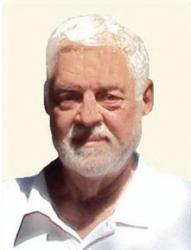My last column ended with my wife, Cathy, and I stuck in a tunnel outside Innsbruck, Austria, when our high-speed train from Venice to Munich broke down. The train was scheduled to arrive in Munich at 10 pm, and the registration desk at our small hotel in a quiet residential area of the city closed at 11 pm.
Fortunately, the Austrians are very efficient, and had us moving again in about half an hour, albeit at reduced speed. We were relieved when they announced our new arrival time was 10:45 because we would still have time to get our hotel room … That’s what we thought.
A few stations after Innsbruck, the train stopped again. I thought we were getting a faster engine. But a squad of Austrian police came on board. They were checking for refugees.
Europe is having a major problem with refugees fleeing the fighting in Syria and Libya, trying to cross the Mediterranean in rickety over-crowded boats, then making their way north to Austria and Germany. Many of the boats have sunk, and the bodies have washed ashore in Italy and Greece.
The Austrians recently found an abandoned truck with 70 refugees inside who had died from asphyxiation because the truck had no ventilation.
Although the police found no refugees on our train, their search delayed us nearly an hour, so we didn’t arrive in Munch until midnight.
We grabbed a taxi and rushed to the hotel, but it was too late. The front desk was closed. There was an emergency number on the door, but no one answered our repeated calls, so we were unable to get our room key.
So there we were: stranded on the street in Munich with our luggage at 1 am.
I suggested we sleep on the hotel patio until someone showed up in the morning, but Cathy would have none of it. I won’t tell you the words she used. But her demands included a bed, a bathroom with a shower, air conditioning and an electrical outlet for her hairdryer. Women!
So we walked to an all-night gas station/convenience store on the corner. A young taxi driver was getting coffee and I explained our predicament to him as best I could with my rusty German. He got on his cell phone and began calling hotels in search of a vacant room for us. Other patrons stopped to help and we soon had eight Germans gathered around us calling hotels on their cell phones; they included a barefoot man who had been a bit over-served from the beer locker.
It took about half an hour, but a room was finally located across town. It was expensive, but Cathy’s hair looked good in the morning.
The next three days went without crisis. Munich is a beautiful city in the Bavarian Alps about 30 miles from the Austrian border. We soon mastered the city train system, which is very efficient.
Over the next three days, we visited Marienplatz in the center of the city with its medieval churches and town hall; the famed Hofbräuhaus that’s been serving beer since 1589; and the beautiful Andechs Monastery high on a hill where the Benedictine monks have been brewing some of the best beer in Europe since 1455. (Do you notice a pattern here?). We also spent a day in Sendberger, a small town on an Alpine lake southwest of Munich.
One thing I wanted to do while we were in Munich was visit the memorial at the infamous Dachau concentration camp 10 miles outside the city. We knew it would be a downer, so we waited until the last day.
Dachau wasn’t an extermination camp like Auschwitz and the other death camps in the east. It was a concentration camp set up by the Nazis shortly after they came to power in 1933 to hold “enemies of the state.” Its prisoners included communists, Catholic clergymen and writers who spoke out against the Nazi regime, as well as “social undesirables,” such as Gypsies, Jews, homosexuals, adulterers and other German citizens the Gestapo didn’t like.
One enters Dachau through a wrought iron gate inscribed with the words “Arbeit Macht Frei,” which translates to “work will set you free” in English.
Dachau was a forced labor camp originally designed to hold 6,000 prisoners who were to work at a munitions factory located adjacent to the camp. But it was almost always crowded with twice that many prisoners. The system grew to include nearly 100 sub-camps that held an additional 10,000 prisons who worked on farms, in quarries and at local industries, including the BMW plant in Munich-Allach, which was the largest aircraft engine factory in the German Reich.
Life in these camps was brutal. Food was scarce and discipline was at the discretion of the sadistic S.S. guards.
But Dachau was a profit center; the S.S. made a lot of money leasing out these workers and they wanted to keep them alive, if just barely.
Conditions turned much worse as Germany began to lose the war and the Nazis tried to hide their atrocities from advancing Allied forces by transferring prisoners from camps outside Germany to camps inside Germany, such as Dachau. By the time U.S. forces arrived and liberated Dachau in 1945, the camp was strewn with nearly 30,000 dead or nearly-dead prisoners.
The gruesome scene so enraged the U.S. soldiers that they summarily executed the S.S. guards, including those who had already surrendered. An investigation into the massacre was launched by the Army, but squelched by General Patton.
I am of German ancestry. I love the German people, their culture and consider Germany my “fatherland.” Because of this, one question that has plagued me since I was stationed in Germany as a soldier 50 years ago is: How could such good Christian people, with their beautiful churches, fine universities, and cultural heritage, have allowed themselves to be led down such an evil path?
The answers are complex, but in many ways they resemble the situation in America today.
Many Germans believed their nation had been “stabbed in the back” in World War I when its generals surrendered and were forced to sign the Treaty of Versailles, which stripped Germany of its foreign lands and imposed harsh reparations on Germany for starting the war. The German currency soon collapsed, plunging the country into a deep recession. As the German people suffered, they blamed international bankers, Jews and other immigrants for their problems. They wanted a strong leader to make Germany great again, and saw Adolph Hitler as their savior. They willingly surrendered their constitutional rights and civil liberties to the Nazi Party and Dachau was the result.















Comments are closed.